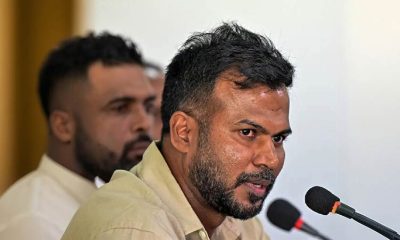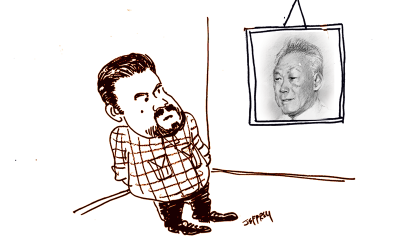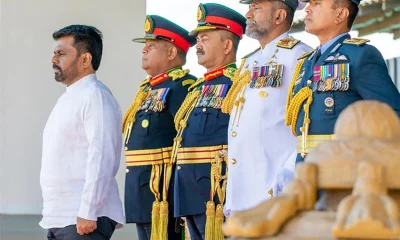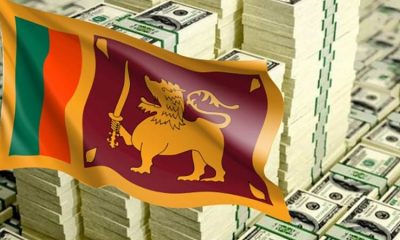Editorial
Easing casino rules

There were reports last week that rules relating to the operation of casinos in Sri Lanka are being broadened in an effort to attract international players into the country. This is something that our beleaguered tourism industry will welcome. The availability of gaming opportunities is a visitor draw, as has been proved at many global destinations and even here during an earlier period. But governments have been ambivalent in their approach to the issue with moral and commercial dimensions opposing each other. As readers are very well aware, there are two established casino businesses already in operation in the country, one of them owned by the politically influential tycoon, Dhammika Perera who earlier this year was appointed to parliament on the SLPP National List replacing former Finance Minister Basil Rajapaksa. He was soon thereafter appointed a cabinet minister.
Perera, amid the convulsions caused by the Aragalaya that led to both the departure of Prime Minister Mahinda Rajapaksa and President Gotabaya Rajapaksa, since resigned his portfolio of Investment Promotion. To accept first parliamentary membership and then cabinet office, he quit the chair and board positions in a string of quoted and unquoted companies, including the Hayleys conglomerate, he controls. Whether he will return to the cabinet where more vacancies are due to be filled in the short term is yet an open question. Given speculation at the time he quit the cabinet that he may also vacate his parliamentary seat and whether he would wish to continue the political journey he embarked on remains to be seen. Long considered a Rajapaksa afficionado he, while continuing his business interests, unusually held the position of Secretary to the Ministry of Transport during the Mahinda Rajapaksa presidential tenure.
Older readers would remember a time when horse racing was conducted in Colombo, Boossa (near Galle) and Nuwara Eliya on a scale far grander than what prevails today with only the Nuwara Eliya race course remaining. But following the election of the SWRD Bandaranaike government in 1956, a ban on the import of race horses and gambling was imposed. This was welcomed, particularly by housewives with gambling addicted husbands flocking to the Colombo racecourse on Saturday afternoons and gambling away their pay packets.
Although horse races were not run here thereafter, the bookies developed a lucrative business accepting bets on the English races. This business thrived despite a ban on the publication of racing news that the mainstream newspapers complied with. But illegal race sheets on British races were freely available and no serious effort made to control the industry that thrives to date. The once grand Colombo race course occupying a vast acreage of prime city land was allowed to run down until then Defence Secretary Gotabaya Rajapaksa, wearing a second hat as Secretary Urban Development, beautified and commercialized the valuable resource.
Some Colombo five-star hotels were also permitted to run casinos some years ago in a short-lived experiment at a time when the hotel industry was gasping for survival during the war years. More recently the Australian gambling Moghul James Packer wanted to set up here and the ambivalence of the government’s attitude to gambling in the context of lobbies for and against was very visible. This was demonstrated by President Premadasa’s order to peremptorily deport Joe Sim, active in the then casino industry. Even the JKH-controlled Cinnamon Life project, probably the country’s biggest urban development investment ever, had space for gambling in its original design though the developer himself had no plans to enter the industry. It merely wished to let out space to an operator and it was whispered at the time that the pinnacle of government had expressed its preferences on who should get that space.
Now that a gazette has been issued to legalize and regulate casinos, opening the doors for the entry of global operators effective from Sept. 1, a reversal of the president’s previous outlook, it clearly seems that government has chartered a pragmatic course. Moral objections will obviously arise and there will be questions on how effective the regulatory mechanism will be. Political forces will inevitably mount the bandwagon and whether the administration will hold its ground remains an open question. At one point of time, Sri Lankans were supposed to be not permitted in casinos that ostensibly were exclusively reserved for foreigners. But that was not strictly enforced.
The availability of sexual services in and around casinos was widely rumoured and many ladies of allegedly easy virtue from Eastern Europe, former Soviet Republics and elsewhere were common sights in casino neighbourhoods. The new regulations have taken notice of this factor but how effectively it can be controlled remains to be seen. There is also the question of whether casino operators are paying proper taxes.
Macau, for example and more recently Singapore have done very well with casinos. Most Lankans will not wish this country to be a gambling dependent Macau but Singapore has for long been regarded here as an iconic model of development and good governance. It would be freely admitted that the way Singapore is run and how we run our affairs are chalk and cheese. Thus, even a shadow of the efficiency with which regulatory affairs are conducted there will not be possible here.
We cannot also forget that narcotic drugs first significantly entered this country with hippy tourists in the sixties and seventies. Links between organized crime and industries such as drugs, illicit liquor and gambling are easily developed. We already have serious drug and illicit liquor problems. But our tourism industry in which billions of rupees have been invested and a significant proportion of the work force depends on for a living needs all possible support; and so also the revenue-strapped treasury coffers.
Editorial
‘Swindlers List’

Thursday 26th December, 2024
Power not only corrupts but also makes the wielders thereof cherish the delusion that popular mandates are cartes blanches for them to do as they please and be above the law. This fact has been borne out by the despicable manner in which the President’s Fund has been misused, if not abused, under successive governments.
Thankfully, the President’s Fund is now under the microscope, and numerous questionable fund allocations have already come to light. It has been revealed that the Executive Presidents during previous dispensations arbitrarily allocated money from the President’s Fund to their kith and kin at the expense of the needy on the waiting list.
The JVP-led NPP government has released a list of politicians who have obtained money from the President’s Fund over the years in violation of the terms and conditions governing the provision of relief therefrom. All of them have obtained huge sums of money by leveraging their political connections, and those shameless characters include a tainted politician who fell off an upper-floor balcony of a hotel down under, over a decade ago, while trying to enter an adjoining room a la Spider-Man; he eventually got entangled in a web of lies of his own making.
Embroiled in an academic credentials scandal and unable to make good on its election promises and solve burning issues such as the shortages of rice and coconut and the soaring prices of essentials, the NPP government is all out to divert attention from its failure by carrying out propaganda attacks on the Opposition, which is on the offensive. However, the release of the Swindlers List, as it were, and the police probe into the misuse of the President Fund are most welcome. This has been an unintended benefit of the ongoing propaganda battle between the government and the Opposition.
As for financial assistance from the President’s Fund for patients, one of the conditions stipulated by law is that the family of the patient seeking relief is without adequate financial resources to meet the cost of surgery/treatment. It has also been specified that the monthly income of the family including the patient, spouse and unmarried children should not exceed Rs. 200,000, and a Divisional Secretary should recommend that the person concerned is eligible for financial assistance.
The President’s Fund relief scheme for patients was launched to provide financial assistance to low-income individuals who lack the means to bear the costs of medical treatment or surgery. It is therefore wrong for the President and/or the governing board of the Presidential Fund to grant funds to those who have the wherewithal to afford treatment or surgery either in this country or overseas.
Obviously, politicians who spend colossal amounts of money on their election campaigns and live the high life, residing in palatial houses, moving about in super-luxury vehicles, and travelling the world, are not eligible for financial assistance from the President’s Fund.
The CID is reported to have been called in to investigate the misuse/abuse of the President’s Fund. One cannot but agree with the incumbent government on this score although it is driven by an ulterior motive. One can only hope that the ongoing investigation will reach a successful conclusion, and legal action will be instituted against all those who are responsible for the misappropriation of state funds.
The Swindlers List submitted by the NPP government to Parliament is incomplete; it contains only the names of Opposition politicians. The public has a right to know how all Presidents have misused/abused the President’s Fund since 1978. Are there any individuals connected to the JVP or the NPP among those who have received financial assistance from the President Fund fraudulently, as claimed by Opposition MP Dayasiri Jayasekera, one of those exposed by the government?
Let Minister and Cabinet Spokesman Dr. Nalinda Jayatissa be urged to make public a complete list of beneficiaries of assistance from the President’s Fund instead of releasing names selectively to settle political scores. The NPP government, which is full of self-righteous members, should be able to do so if it has nothing to hide. It is hoped that the Opposition MPs who have not abused their political connections to obtain assistance from the President’s Fund will crank up pressure on the government to do so.
Editorial
Of that half-open can of worms

Wednesday 25th December, 2024
The CID has once again proved its selective efficiency and adeptness at doing political work. No sooner had it received a complaint from Justice Minister Harshana Nanayakkara that someone had sought to discredit him by having the title, ‘Dr’, placed before his name on the parliamentary website than it launched an investigation, interrogated the parliament staff and recorded statements, but its probe has apparently come up against a brick wall.
Parliament workers have reportedly informed the CID that the titles given to the NPP MPs on the House website are based on information contained in a letter sent by the office of the Leader of the House, Bimal Ratnayake. What is described as an image of the letter in question is doing the rounds in the digital realm. The government has chosen to remain silent on the letter and the progress in the CID probe, which is bound to open a can of worms for it.
What will the CID do now? Will it grill the staff of the Leader of the House as well? It will be interesting to see what the government’s reaction is. Will the Justice Minister, who thinks there has been a sinister campaign against him, urge the CID to go the whole hog and get to the bottom of it?
Strangely, an official of the Parliament Communication Department apologised to Minister Nanayakkara for what he called an inadvertent data entry error which had led to the placement of ‘Dr’ before Nanayakkara’s name. He issued a statement to that effect when the Opposition raised questions about the academic credentials of the NPP MPs. He owes an explanation to the public.
Minister Nanayakkara, after lodging his complaint with the CID, told the media that he suspected that there was a conspiracy to tarnish his image. Implying the involvement of his political opponents in ‘the conspiracy’, he went on to claim that ‘the dog’ (read the previous dispensation) had been got rid of but there were some ‘fleas’ left, and they too would be dealt with appropriately. He also expressed concern about what he called a counterrevolution.
The Justice Minister has caused a great injustice to man’s best friend. The NPP won elections by condemning the members of the previous government as a bunch of crooks who deserved to be behind bars for their many crimes; they included a politician who lined his pockets at the expense of cancer patients. Now, the Justice Minister likens those characters to canines!
The mention of ‘counterrevolution’ must have sent a chill down the spines of those who are au fait with world history, especially the brutal manner in which some self-proclaimed socialist regimes dealt with ‘counterrevolutionaries’; they resorted to witch-hunts and kangaroo trials which led to the elimination of dissenters. This country is no stranger to savage political violence.
Going by the aforesaid leaked letter, a wag asks whether the office of the Leader of the House has become the cradle of the ‘counterrevolution’ and home to the ‘fleas’ that have left the ‘dog’ in flight.
It defies comprehension why Minister Nanayakkara made a beeline for the CID over the doctorate issue. He should have taken it up with the Speaker and the Secretary General of Parliament and asked for remedial action. That is the proper procedure. Unfortunately, aspersions are now being cast on certain parliament officials.
The NPP parliamentary group has some members who served in previous parliaments and therefore are familiar with parliamentary affairs, and it is incumbent upon them to guide their junior colleagues.
Editorial
Grim Reaper in overdrive

Tuesday 24th December, 2024
A sharp increase in fatal road accidents during the past few weeks has jolted the police into inspecting vehicles to check their roadworthiness. As many as 13 lives were lost in road mishaps on Saturday (21). It is believed that many such accidents occur due to the sheer number of unroadworthy vehicles on the road, posing safety risks to motorists, passengers and pedestrians alike. The police must step up inspections and prosecute the drivers and owners of unsafe vehicles.
In 2023, about 2,500 lives were lost in 2,200 road accidents in Sri Lanka, according to the police. Pedestrians accounted for the highest number of road traffic fatalities––more than 740.
Legal action must be instituted against those who issue bogus fitness certificates for unroadworthy vehicles, especially buses and trucks. If the existing laws do not provide for deterrent punishment for them, new ones will have to be introduced as a national priority.
A World Bank (WB) report, Delivering Road Safety in Sri Lanka Leadership Priorities and Initiatives to 2030, provides a number of valuable insights into the deterioration of road safety in Sri Lanka, and spells out what needs to be done to remedy the situation. The following, inter alia, have been identified as the causative factors: an increase in the number of vehicles, poor road maintenance, improper road expansion, less scrutiny in issuing driving licences, ineffectiveness of the authorities in penalising road traffic offences, and inefficiency of public transport system. Citing anecdotal evidence, the report points out that speeding, drunk driving, fatigue, tyre bursts, animal crossing and unprotected level crossings are some other causes of road accidents. The ever-increasing narcotic addiction among drivers of heavy vehicles has also become one of the main causes of road fatalities.
The aforesaid WB report informs us that Sri Lanka will need an additional investment of USD 2 billion to achieve the Sustainable Development Goal (SDG) 3.6 target of a 50% reduction in national road crash fatalities. Given Sri Lanka’s economic crisis, such a huge investment is not within the realm of possibility, but it is a goal that the country must work towards. There are several practicable measures that can be adopted to save lives in the meantime, vehicle inspections being one of them.
Thanks to stern police action, drunk driving menace is believed to have been brought down to a manageable level, but there has emerged another problem—narcotic addiction among bus and truck drivers.
Lanka Private Bus Owners’ Association President Gemunu Wijeratne is on record as having said that 50% bus drivers and conductors are addicted to drugs countrywide. In 2021, then State Minister Dilum Amunugama revealed that 80% of the bus drivers in Colombo and its suburbs worked under the influence of narcotics. A pilot project conducted by the police last year helped nab about 100 drug addicts behind the wheel. Most of them were addicted to crystal methamphetamine popularly known as ICE. This points to the pressing need for random narcotic detection tests to be increased.
The least that can be done to reduce road accidents and save precious lives is to have the police step up operations to nab drug/alcohol addicts behind the wheel, rein in reckless drivers, find unroadworthy vehicles and bust rackets related to the issuance of driving licences and vehicle fitness certificates. That may be the way to make the Grim Reaper, currently in overdrive, downshift and slow down until a comprehensive road safety programme is launched with the participation of all stakeholders to achieve the SDGs.
-

 Sports7 days ago
Sports7 days agoSri Lanka to mend fences with veterans
-

 Sports5 days ago
Sports5 days agoPathirana set to sling his way into Kiwi hearts
-

 Opinion7 days ago
Opinion7 days agoIs AKD following LKY?
-

 News3 days ago
News3 days agoOffice of CDS likely to be scrapped; top defence changes on the cards
-

 News6 days ago
News6 days agoSL issues USD 10.4 bn macro-linked bonds
-

 Opinion7 days ago
Opinion7 days ago‘A degree is not a title’ – a response
-

 Editorial6 days ago
Editorial6 days agoRanil’s advice
-

 Editorial7 days ago
Editorial7 days agoLest watchdogs should become lapdogs











